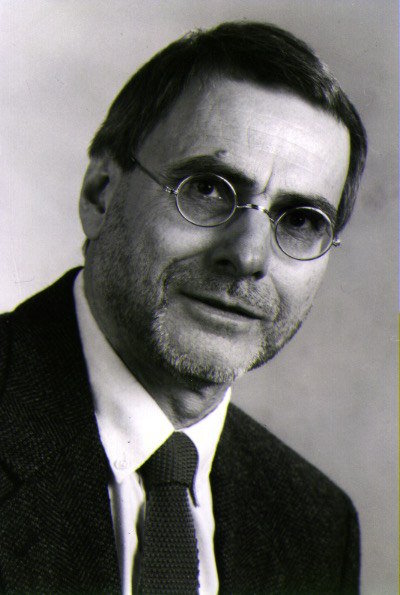Nachruf
Eberhard Kirchberg (1946 - 2022)
Nachstehend wird ein Nachruf für Eberhard Kirchberg wiedergegeben, der seinerzeit
auf der Homepage des Fachbereichs Mathematik der Humboldt-Universität zu Berlin
publiziert wurde
(mit freundlicher Genehmigung der Autoren):
On the 12.08.2022 our former colleague, Eberhard Kirchberg, Professor for Functional Analysis at the Humboldt University in Berlin passed away. He has made fundamental contributions to the fields of operator algebras, K-theory and noncommutative geometry. Even though in the last couple of years Kirchberg avoided the mathematical spotlight, the news of his passing away was received with deep sorrow.
Prof. Dr. Eberhard Kirchberg was born on 14.1.1946. After growing up in Freiberg in the former GDR, from 1964 to 1970 he studied mathematics at the University of Greifswald. After a scientific stay at the University of Warsaw, being also under the mathematical influence of G.I.Kac (Kiew), he obtained his doctoral degree at Greifswald in 1978. He then worked as a scientific assistant at the Institute of Mathematics of the Academy of Sciences in East-Berlin.
During those years he acquired the reputation of a political dissident, even though he never challenged the system publicly. It came to an incident during the elections to the GDR Volkskammer in 1981 where he voted with a 'no' and accidentally dropped his ballot paper so that it became visible. This was taken as a provocation and consequently he instantly lost his job at the Institute of the Academy. From then on he was permanently pursued by the authorities and was basically out of work until 1988. In 1988 he participated in a manifestation organized by the protestant church. He was arrested and confronted with a choice between many years of prison and expulsion to West Germany. He chose the latter.
During the time of unemployment Kirchberg had continued working on delicate properties of tensor products of C*-algebras - motivated by the use of such products in his PhD Thesis on group duality and Hopf algebras. A small part of this work was known to experts in the west. Helmut Koch (at the time working at the Institute of the Academy in East-Berlin) informed via Hirzebruch several people of Kirchberg's delicate situation. By a combination of lucky coincidences, Kirchberg then obtained a job as “Wissenschaftlicher Assistent" with Joachim Cuntz at Heidelberg University. There he had the possibility to work out the ideas that he had developed during the time in East Berlin when he was out of work. This resulted in a series of influential papers, published in Inventiones Math., Crelles Journal or Mathematische Annalen.
Perhaps the most celebrated paper from that time was his reformulation in several surprising ways of the famous Connes Embedding Problem (if tracial von Neumann algebras, or C*- algebras, can be approximated in a precise way by matrix algebras). One reformulation asks if all C*-algebras are QWEP (a quotient of a C*-algebra with the weak expectation property). Another reformulation was in terms of uniqueness of C*-tensor products of C*-algebras associated with the free groups. This work later led to the reformulation of the Connes Embedding Problem into Tsirelson's problem concerning quantum correlations, which recently has been announced to have a negative answer.
Kirchberg initiated the study of exactness of C*-algebras, a deep analytic property defined in terms of tensor products, which plays an increasingly important role in the study of C*-algebras, as well as in group theory. The existence of non-exact discrete group was for several years a mystery. Gromov outlined a strategy to construct such groups using expander graphs. In another paper, Kirchberg studied the C*-algebras arising from groups with Kazhdan's property (T), and proved that such groups are residually finite if and only if they have the so-called factorization property, a property defined by Kirchberg in terms of tensor products. In this paper, Kirchberg also introduced “liftable” traces (also called amenable traces) which later have found several important applications within the theory of C*-algebras, for example to decide which C*-algebras are quasidiagonal.
Kirchberg found a new mathematical life in West Germany. His work quickly became much appreciated and became widely known, and he was present (most often as an invited speaker) at many mathematical meetings and became a familiar face in the community. He started collaborations with several colleagues in many different areas of operator algebras, and in fact most of his papers from then on were with coauthors.
In the course of the restructuring of the universities in East Germany after the German reunification, Kirchberg obtained in 1993 a Professorship at the Humboldt University in Berlin.
He was invited to give a talk at the International Congress of Mathematicians in 1994 at Zurich. There he announced groundbreaking new results on the classification of nuclear C*-algebras that changed the face of the subject. His results showed that algebras that arose in very different ways are actually isomorphic. This was a starting point for deep work by himself and other mathematicians culminating in a completely unexpected classification of an important class of simple nuclear purely infinite C*-algebras, now known as Kirchberg algebras, merely by their K-groups, that is, by a pair of countable abelian groups. This breakthrough turned out years later to be the basis for deep work by many experts in the field leading recently to a classification of a more general class of separable nuclear simple C*-algebras by a somewhat more complicated invariant of a K-theoretic nature. This is widely regarded as one of the most important results in operator algebras.
The last years of his life, though avoiding the spotlight, Kirchberg continued to work on refinements and extensions of his results. His deep contributions to mathematics still influence current research, and his name continues to be mentioned frequently at operator algebras conferences. With his passing away, the Humboldt University loses a much-appreciated colleague who significantly influenced the mathematical life in Berlin both before and after the German reunification.
Bildnachweis
| Porträt | von der Seite https://www.mathematik.hu-berlin.de/de/kirchberg.jpg/view übernommen |
